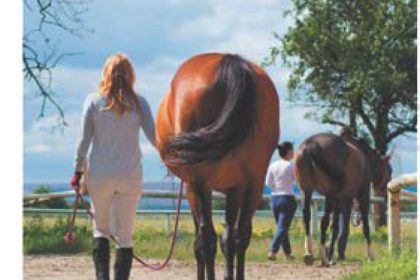Summer Lip Sores
2024
Habronema muscae – a parasite of the common house and stable fly. Lingfield student research resource contains information on assorted topics. www.horse-care.uk
Habronemiasis – these little raised and usually circular sores, are one condition that many people do not associate with flies – the often seen and common house and stable flies.
Often simply termed ‘Summer sores’ – round sores and open wounds often seen around the lips and mouth – is caused by stomach worm. This is yet another worm/parasite for you and your horse to cope with. As the climate becomes warmer we are seeing this more often in the UK.
The larvae of Habronema are released and burrow into wounds or soft and moist areas – often around the mouth, eyes, inside of upper legs, sheath etc. – causing granulation and proud flesh around a small round wound.
Typical signs include nonhealing skin lesions, there may be intense itching and the formation and granulation of proud flesh. They may occur are anywhere that a wound occurs or simply on soft and moist areas of the body.
The sores generally develop in moist areas of the body because those are areas where flies commonly feed.
For development of the parasite the released larvae (in equine droppings) must be ingested by an intermediate host. This initial host is usually the stable fly or the house fly.
In the normal stomach worm life cycle, flies pick up the stomach worm larvae in horse manure, old bedding, rotten feed, etc., and deposit them near the horse’s mouth.
The horse ingests the larvae that travel to the stomach and, in approximately two months, mature into adult worms that usually cause very little damage to the horse. The adults lay eggs that are passed in the horse’s manure. Flies pick up the hatched larvae and cycle starts all over again. The problem occurs when the stomach worm larvae are deposited by house, stable or face flies that feed on fresh wounds or areas of moisture.
The larvae which has not now been ingested, but is in the skin/tissue, cannot mature into adult worms, so they migrate around in the horse’s wound, causing local inflammation and severe itching. In lesser cases we see the small round sores or lesions.
Treatment: In small lesions, deworming the horse with either Ivermectin or Moxidectin will kill the worm larvae and allow the sore to heal. Only these two active ingredients will be effective.
In more severe cases where a significant amount of proud flesh has formed, it might have to be removed surgically before treatment can be started. Treatment of Summer sores is often difficult and can require a number of approaches. Treatment by Ivermectin or Moxidectin should be undertaken in concert with application of topical treatment directly on the lesion to reduce inflammation and itching. It might also be necessary to cover the lesion if it occurs on the horse’s legs to protect the wound and prevent the horse from chewing.
Fly control is essential to prevent additional stomach worm larvae from entering the lesions. Here are a few fly control tips: Keep the property as a whole, cleaner in all areas
Remove manure from in and around stables and buildings daily – sweep clean. Remove old or excess feedstuffs, clean feed buckets and mangers properly after each meal. Romove and sweep away all wet straw or bedding and other materials daily to prevent fly breeding sites and the hatching of fly larvae (maggots). Muck heaps should be properly managed (squared and flattened) on a daily basis to maximize heat production that will kill hatching fly maggots. Insecticides fly traps and baits, residual fly sprays to the premises, fly prevention face masks and repellents are all beneficial.



Receive latest news and industry insights straight to your inbox.